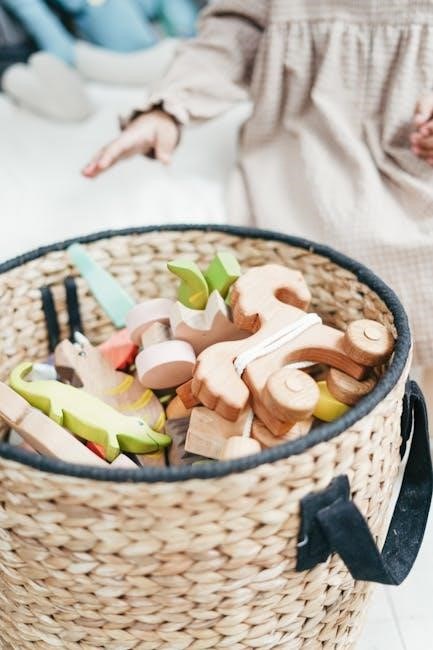Preschool readiness ensures children are prepared socially‚ emotionally‚ and academically for their first educational experiences. A preschool readiness checklist helps track developmental milestones‚ guiding parents and educators in creating a smooth transition to formal schooling.
Understanding the Importance of Preschool Readiness
Preschool readiness is crucial for children to thrive in their first educational experiences. It fosters social‚ emotional‚ and cognitive development‚ ensuring a smooth transition to formal schooling. A preschool readiness checklist helps identify key milestones‚ such as independence‚ communication‚ and problem-solving skills‚ while addressing areas that may need additional support. Early preparation enhances academic performance and builds confidence‚ setting the foundation for lifelong learning and success.
Key Areas of Development to Assess
Evaluating preschool readiness involves assessing social‚ emotional‚ cognitive‚ and physical development. A preschool readiness checklist typically includes skills like cooperation‚ empathy‚ problem-solving‚ memory‚ motor abilities‚ and language proficiency. These areas ensure children are well-rounded and prepared for the challenges of formal education‚ fostering a strong foundation for future academic and personal growth.
Social-Emotional Readiness
Social-emotional readiness involves skills like cooperation‚ empathy‚ and self-regulation. A preschool readiness checklist evaluates a child’s ability to interact with peers‚ understand boundaries‚ and express emotions effectively.
Cooperation and Sharing with Peers
Cooperation and sharing are vital for building friendships and social skills. A preschool readiness checklist assesses a child’s ability to take turns‚ share toys‚ and collaborate in group activities‚ fostering teamwork and emotional growth through play-based interactions.
Empathy and Understanding Boundaries
Empathy and boundary understanding are key social skills for preschoolers. A preschool readiness checklist evaluates a child’s ability to recognize others’ feelings‚ respect personal space‚ and respond appropriately‚ promoting positive interactions and emotional intelligence in a group setting.
Independence in Completing Simple Tasks
A preschool readiness checklist assesses a child’s ability to perform simple tasks independently‚ such as dressing‚ using utensils‚ and completing puzzles. This skill reflects problem-solving abilities and self-confidence‚ preparing them to engage in classroom activities and take ownership of their learning process.
Cognitive Development and Readiness
Cognitive development involves problem-solving‚ memory‚ and understanding shapes‚ colors‚ and numbers. A preschool readiness checklist evaluates these skills‚ ensuring children can match objects and sort items by shape and color‚ preparing them for classroom learning activities.
Problem-Solving Skills and Curiosity
Problem-solving skills and curiosity are vital for preschool readiness. A checklist assesses a child’s ability to explore‚ ask questions‚ and solve simple problems. Encouraging play-based learning fosters curiosity‚ while tasks like matching objects or sorting shapes enhance problem-solving abilities‚ preparing children for classroom challenges and independent thinking.
Memory and Imitation Abilities
Memory and imitation abilities are key indicators of preschool readiness. A checklist evaluates a child’s capacity to recall simple sequences and mimic actions or words. Play-based activities‚ like following instructions or repeating patterns‚ strengthen these skills‚ laying the foundation for learning and social interaction in a preschool environment.
Understanding Shapes‚ Colors‚ and Numbers
Recognizing shapes‚ colors‚ and numbers is a fundamental skill assessed in preschool readiness. A checklist helps track a child’s ability to identify basic shapes‚ name colors‚ and count objects. These skills are essential for math concepts and problem-solving‚ preparing children for academic success in preschool and beyond.

Physical Development Readiness
Physical development readiness involves assessing a child’s coordination‚ balance‚ and motor skills. A checklist evaluates tasks like running‚ drawing‚ and using utensils‚ ensuring readiness for preschool activities.
Fine Motor Skills: Using Utensils and Dressing
Fine motor skills are essential for preschool readiness. A child should demonstrate the ability to use utensils like spoons and forks effectively. Dressing independently‚ including zipping and buttoning‚ is another key milestone. These skills indicate hand-eye coordination and dexterity‚ crucial for activities like drawing and writing. A checklist helps track progress in these areas‚ ensuring readiness for classroom tasks.
Gross Motor Skills: Running‚ Jumping‚ and Balance
Gross motor skills‚ such as running‚ jumping‚ and balancing‚ are vital for preschool readiness. These abilities reflect overall physical coordination and strength. A child should demonstrate confidence in moving around‚ climbing‚ and maintaining balance. Including these milestones in a checklist helps assess physical development and readiness for active play in a preschool environment‚ fostering independence and social interaction.
Hand-Eye Coordination and Drawing
Hand-eye coordination and drawing skills are essential for preschool readiness. Children should show ability to use utensils‚ draw simple shapes‚ and copy patterns. Including these tasks in a checklist helps evaluate fine motor development‚ creativity‚ and readiness for interactive learning activities‚ preparing them for academic and artistic tasks in preschool settings.
Language and Communication Skills
Language and communication skills are vital for preschool success. A checklist should assess vocabulary size‚ ability to form sentences‚ and capacity to understand and follow simple instructions effectively.
Vocabulary and Sentence Formation
A robust vocabulary and ability to form clear sentences are key indicators of preschool readiness. A checklist should include identifying common objects‚ using descriptive words‚ and constructing simple‚ grammatically correct sentences to convey thoughts and needs effectively. This skill lays the foundation for communication and future academic success in a structured learning environment.
Listening and Following Instructions
Listening and following instructions are crucial for preschool readiness. A child should demonstrate the ability to understand and complete simple tasks‚ such as putting away toys or moving to the next activity. This skill helps in classroom management‚ reduces frustration‚ and shows readiness to engage in structured learning environments alongside peers and teachers.
Expressing Needs and Feelings Clearly
Children should be able to express their needs and feelings effectively using words or simple sentences. This ability fosters communication‚ reduces tantrums‚ and builds confidence. Preschoolers who can articulate their emotions and requirements are better equipped to navigate social interactions and seek help when needed‚ enhancing their emotional well-being and classroom integration.
Academic Preparation for Preschool
Academic preparation for preschool involves basic math and literacy skills. Recognizing shapes‚ colors‚ and letters‚ along with counting and sorting‚ lays a strong foundation for future learning.
Recognizing Letters and Sounds
Recognizing letters and sounds is a foundational skill for early literacy. Children should identify uppercase and lowercase letters‚ associate sounds with symbols‚ and demonstrate an understanding of rhyming and word families. This skill is crucial for reading readiness and can be reinforced through activities like alphabet games and phonetic exercises.
Basic Math Concepts: Counting and Sorting
Mastering basic math concepts‚ such as counting and sorting‚ builds a strong foundation for future numerical skills. Children should be able to count up to 20‚ identify numbers‚ and sort objects by shape‚ color‚ and size. These activities enhance problem-solving abilities and prepare them for more complex mathematical concepts in later years.
Interest in Books and Storytelling
Encouraging an interest in books and storytelling fosters a love for reading and improves language skills. Children should enjoy listening to stories‚ retelling simple narratives‚ and engaging with pictures. This curiosity lays the groundwork for literacy development and a lifelong appreciation for learning‚ making it a key component of preschool readiness.
Separation Anxiety and Readiness
Children often experience separation anxiety when starting preschool. A readiness checklist helps assess their ability to adapt to new environments and cope with emotional transitions smoothly.
Comfort with New Environments
A child’s ability to adapt to new settings is crucial for preschool success. A readiness checklist can help assess if they explore new spaces with curiosity‚ show interest in activities‚ and engage with others calmly. This comfort reduces separation anxiety and eases the transition to preschool‚ ensuring a positive start to their educational journey.
Ability to Separate from Parents
A child’s ability to separate from parents is a key indicator of preschool readiness. A checklist can evaluate if they show independence‚ express emotions calmly‚ and trust new caregivers. This skill fosters confidence and helps children thrive in a new environment‚ laying a strong foundation for social and emotional growth in preschool.
Coping Strategies for Transition
Coping strategies for transition are essential for preschool readiness. A checklist can identify if a child uses tools like communication‚ routines‚ or comfort objects to manage change. These strategies help reduce anxiety‚ ensuring a smoother adjustment to the preschool environment and fostering resilience as they encounter new experiences and challenges independently.

Choosing the Right Preschool Program
Selecting the ideal preschool involves evaluating factors like curriculum quality‚ teacher qualifications‚ and safety standards. A readiness checklist ensures alignment with the program’s goals and environment‚ fostering optimal early learning experiences for your child.
Understanding Different Preschool Models
Various preschool models cater to diverse learning needs‚ such as Montessori‚ Waldorf‚ and play-based programs. Each model emphasizes unique teaching methods and philosophies‚ ensuring parents can choose an environment that aligns with their child’s developmental style and readiness checklist requirements‚ promoting holistic growth and preparation for future academic success.
Considering Class Size and Teacher Qualifications
Smaller class sizes and highly qualified teachers significantly impact preschool effectiveness. Look for programs with low teacher-to-student ratios and staff holding certifications in early childhood education. These factors ensure personalized attention‚ fostering cognitive and social development‚ aligning with the readiness checklist goals for optimal child preparation and a strong educational foundation.
Evaluating Safety and Curriculum Quality
A safe environment and engaging curriculum are critical for preschool readiness. Ensure the facility meets safety standards‚ with secure access and emergency plans. The curriculum should be age-appropriate‚ promoting learning through play and covering essential skills like literacy‚ numeracy‚ and social interactions. A well-structured program fosters holistic development‚ aligning with the readiness checklist to prepare children effectively for future academic success.
Red Flags to Watch For
Identify potential issues in preschool readiness‚ such as delayed speech‚ lack of interest in learning‚ or inability to follow directions. These signs may indicate a need for additional support to ensure your child is adequately prepared for the preschool environment.
Delayed Speech or Language Skills
Delayed speech or language skills can indicate a need for early intervention. According to research‚ children with limited vocabulary or difficulty forming sentences may benefit from speech therapy or specialized programs to enhance communication abilities‚ ensuring they are adequately prepared for the social and academic demands of preschool.
Lack of Interest in Learning Activities
A child showing little interest in learning activities may need additional support to develop curiosity and engagement. Parents can foster a love for learning through play-based activities‚ reading‚ and interactive experiences‚ helping to build foundational skills and enthusiasm necessary for a successful transition to preschool.

Preparing Your Child at Home
Parents can foster preschool readiness by creating a nurturing environment with daily routines‚ play-based learning‚ and opportunities for independence‚ laying a strong foundation for future academic success.
Creating a Daily Routine
Establishing a consistent daily routine helps children develop predictability and responsibility. Include structured times for meals‚ play‚ and sleep. Incorporate activities like reading‚ puzzles‚ and simple tasks to foster independence and readiness for preschool. A routine also aids in time management and reduces separation anxiety‚ preparing your child for the transitions they will encounter in a preschool environment.
Encouraging Play-Based Learning
Play-based learning is essential for fostering creativity‚ curiosity‚ and problem-solving skills. Engage your child in activities like building blocks‚ pretend play‚ and arts to enhance their imagination. These experiences help develop social-emotional and cognitive abilities‚ preparing them for preschool. Encourage exploration and hands-on activities to promote independence and confidence‚ laying a strong foundation for future academic success;
Practicing Independence and Self-Care
Encourage your child to perform simple tasks independently‚ such as dressing‚ using utensils‚ and completing puzzles. This builds confidence and self-reliance. Teach basic self-care routines like handwashing and using the bathroom. These skills are crucial for preschool readiness and help your child feel more secure in a new environment‚ promoting emotional and cognitive growth.

Creating a Preschool Readiness Checklist
A preschool readiness checklist helps identify key milestones‚ ensuring your child is prepared for social‚ emotional‚ and academic challenges. Track progress and address areas needing support.
Identifying Key Milestones
Identifying key milestones in a preschool readiness checklist involves assessing social-emotional‚ cognitive‚ physical‚ and language skills. Look for abilities like using utensils‚ recognizing shapes‚ and forming simple sentences. These milestones are foundational for preschool success and help determine if additional support is needed before enrollment. A well-structured checklist guides parents and educators in ensuring a smooth transition to formal schooling.
Tracking Progress Over Time
Tracking progress over time using a preschool readiness checklist allows parents and educators to monitor a child’s development consistently. By regularly assessing skills like using utensils‚ recognizing shapes‚ and forming sentences‚ areas needing extra support can be identified early. This ongoing evaluation ensures a child is well-prepared for preschool and helps create a seamless transition to formal education.
Using the Checklist as a Guide
A preschool readiness checklist serves as a valuable guide for parents and educators‚ outlining essential skills and milestones. It helps identify areas where a child may need additional support‚ ensuring they are adequately prepared for preschool. By focusing on key areas like social skills‚ problem-solving‚ and communication‚ the checklist provides a clear roadmap for fostering readiness and confidence in young learners.
A preschool readiness checklist is a valuable tool for ensuring children are prepared for their educational journey. It helps build confidence and fosters a smooth transition‚ emphasizing the importance of early development and collaboration between parents and educators.
Summarizing the Key Points
A preschool readiness checklist assesses a child’s preparedness across social-emotional‚ cognitive‚ and physical domains. It evaluates milestones like problem-solving‚ communication‚ and independence‚ ensuring a smooth transition to preschool. By tracking these areas‚ parents and educators can identify strengths and areas needing support‚ fostering confidence and readiness for the next educational step.
Encouraging Parents to Take Action
Parents play a vital role in fostering preschool readiness. By using a preschool readiness checklist‚ they can identify areas needing attention and engage in activities that promote learning and development. Ensuring a nurturing environment‚ encouraging play-based experiences‚ and maintaining open communication with educators will empower parents to support their child’s successful transition to preschool and beyond. Consistent effort at home can lead to significant developmental progress‚ laying a strong foundation for future academic success and social confidence. Regularly reviewing the checklist helps parents stay proactive‚ ensuring their child is well-prepared for the challenges and opportunities of preschool life.




